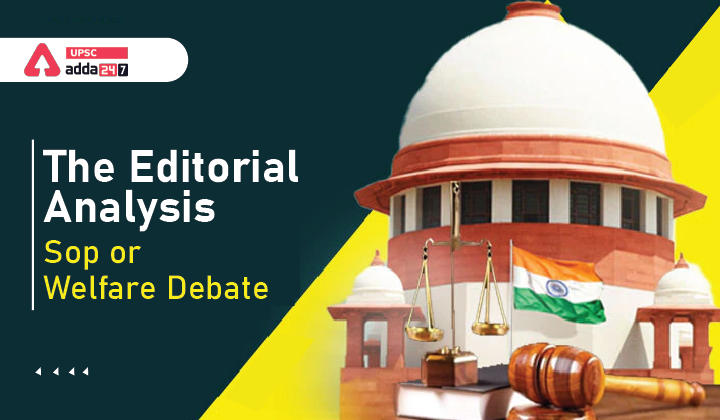Table of Contents
Sop or Welfare Debate- Relevance for UPSC Exam
- GS Paper 2: Governance, Administration and Challenges- Government policies and interventions for development in various sectors and issues arising out of their design and implementation.

Sop or Welfare Debate in News
- Recent Supreme Court’s decision to form a body of stakeholders to examine the issue of ‘freebies’ raises the question whether the legislature can be bypassed on such a far-reaching exercise.
Election to the Office of Vice-President of India
Concerns over Freebies in Elections
- A general concern over ‘freebies’ pushing the economy to ruin or unviable pre-election promises adversely affecting informed decision-making by voters seems reasonable.
- Concerns over what constitutes ‘freebies’ and what are legitimate welfare measures to protect the vulnerable sections
- These are essentially political questions for which a court of law may have no answer.
- Concerns over Supreme Court’s decision to interfere on the freebies which is a legislative matter.
Supreme Court’s Observation
The Chief Justice of India , N.V. Ramana, headed Bench hearing a petition against the distribution or promise of ‘freebies’ ahead of elections made following observations.
- It said that the Court is not going to issue guidelines, but only ensure that suggestions are taken from stakeholders such as the NITI Aayog, Finance Commission, Law Commission, RBI and political parties.
- All these institutions can submit a report to the Election Commission of India (ECI) and Government.
- A suggestion that Parliament could discuss this issue was met with scepticism by the Bench, which felt that no party would want a debate on this, as all of them support such sops.
- The Bench also disfavoured the ECI preparing a ‘model manifesto’ as it would be an empty formality.
- The Court’s concern over populist measures seems to resonate with the Government too, as the Solicitor-General submitted that these distorted the voter’s informed decision-making; and that unregulated populism may lead to an economic disaster.
Subramaniam Balaji vs Government of Tamil Nadu (2013) Judgement
- SC addressed these questions and took the position that these concerned law and policy.
- It upheld the distribution of television sets or consumer goods on the ground that schemes targeted at women, farmers and the poorer sections.
- It said that these were in furtherance of Directive Principles.
- The Court also said that as long as public funds were spent based on appropriations cleared by the legislature, they could neither be declared illegal, nor the promise of such items be termed a ‘corrupt practice’.
- It had, however, directed the ECI to frame guidelines to regulate the content of manifestos.
Election Commission of India (ECI) on Freebies
Following the directions of SC in S. Subramaniam Balaji vs Government of Tamil Nadu (2013) Judgement, ECI took following measures-
- The ECI included in its Model Code of Conduct a stipulation that parties should avoid promises “that vitiate the purity of the election process or exert undue influence on the voters”.
- It added that only promises which were possible to be fulfilled should be made and that manifestos should contain the rationale for a promised welfare measure and indicate the means of funding it.
Conclusion
- Distinguishing welfare measures from populist sops and pre-election inducements, or adding to the obligations of fiscal responsibility and fiscal prudence ought to come from the legislature and not from Judiciary.
Election Commission of India (ECI)



 TSPSC Group 1 Question Paper 2024, Downl...
TSPSC Group 1 Question Paper 2024, Downl...
 TSPSC Group 1 Answer key 2024 Out, Downl...
TSPSC Group 1 Answer key 2024 Out, Downl...
 UPSC Prelims 2024 Question Paper, Downlo...
UPSC Prelims 2024 Question Paper, Downlo...
